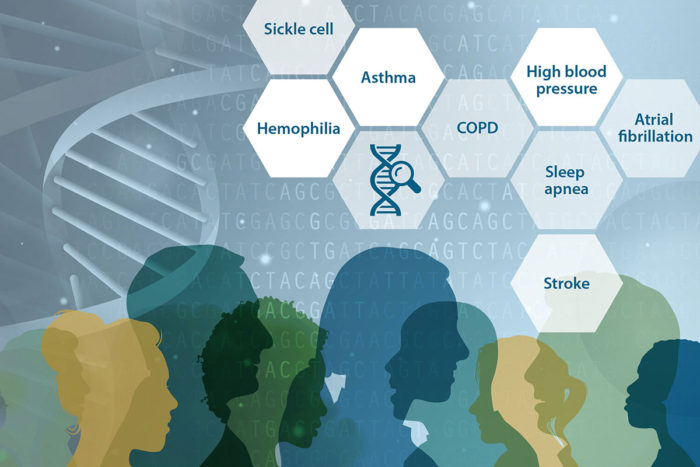$10 million DNA sequencing effort aims to shed light on lung diseases
Research is part of national project to understand genetic roots of heart, lung, blood, sleep disorders
 Sara Moser
Sara MoserA new DNA sequencing project aims to add the genetic data of people from underrepresented groups so that national genomic databases more closely reflect the diversity of the U.S. population.
Washington University’s McDonnell Genome Institute has received $10 million from the National Heart, Lung and Blood Institute (NHLBI) to sequence the DNA of people from diverse ethnic backgrounds, in an effort to identify the genetic roots of chronic obstructive pulmonary disease (COPD) and other lung disorders.
The research is part of a national project to understand the genetics underlying heart, lung, blood and sleep disorders, including high blood pressure, obesity, sleep apnea, stroke, asthma, COPD, hemophilia, sickle cell disease and pulmonary embolism.
“Most other large genome sequencing projects have focused on Europeans and Caucasians,” said principal investigator Susan K. Dutcher, PhD, a professor of genetics and the interim director of the McDonnell Genome Institute at Washington University School of Medicine. “With this program, we are including many people with other racial and ethnic backgrounds. Increasing the diversity of the groups being sequenced is important in understanding how genetic variations influence disease risk.”
The work is part of the NHLBI’s TOPMed program, a national initiative to sequence and analyze the complete DNA — or whole genomes — of patients participating in a number of large U.S.-based clinical trials. The 62,000 participants in the current program are drawn from more than 30 studies, including well-known and long-running studies, such as the Women’s Health Initiative and the Framingham Heart Study.
The clinical trials included in the analysis were chosen to help reduce disparities in sequencing efforts, adding the genetic data of people from underrepresented groups so that national genomic databases more closely reflect the diversity of the U.S. population. Half the participants in the current program are of European descent; 30 percent are of African descent; 10 percent are of Hispanic or Latino origin; eight percent are of Asian descent; and about two percent represent indigenous populations, such as Pacific Islanders.
“It’s also important that the total number of patients in the project is huge,” Dutcher said. “Early phases of TOPMed have already sequenced the genomes of 85,000 people. This year, for Washington University’s portion of the project, we’re sequencing the genomes of about 6,500 patients with lung diseases, primarily COPD and interstitial pulmonary fibrosis, a progressive scarring of lung tissue with variable causes, including autoimmunity.”
The goal of such large genomic studies is to understand how differences in DNA contribute to disease risk. Such investigations may identify variations in genes that increase a person’s risk of developing a particular disease. Conversely, scientists may find variations that are somehow protective, decreasing the risk of a particular disorder. To make these comparisons, researchers require very large sample sizes so they can analyze DNA sequences in the context of the course of the patients’ diseases and in comparison with healthy individuals.
In addition to the McDonnell Genome Institute at Washington University, the other genome sequencing centers involved in the program include the Broad Institute of MIT and Harvard, Illumina, Macrogen, the New York Genome Center and Northwest Genomics Center.






